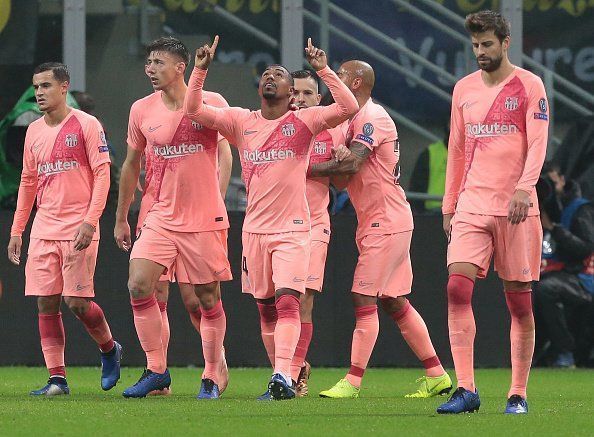
FC Barcelona's history of resilience shows they cannot be written off in Europe
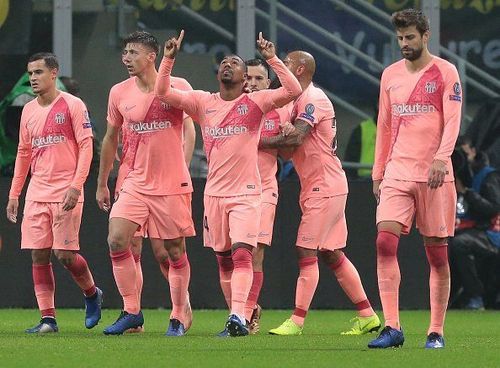
What is resilience? The scholars at Oxford have penned it as the ability to recover from difficulties. From a technical point of view, it is the ability of an object to spring back into shape. But, is that it? Can resilience be explained in a mere sentence?
It is a quality, not many possess. It is a quality that one might possess but still not be aware of. To explain anything, we look for paradigms. Who exemplified resilience? We will look at two, one from the music fraternity and other from a sporting perspective.
There was a band that was formed by three high school students. They had a guitarist, a drummer, and a rapper. But they lacked a lead vocalist. After finishing school, they recruited a lead vocalist, a DJ and a bassist.
The band started recording in the studio of a band member, which ironically was his bedroom. With limited resources, they got out a four-track demo tape. However, success wasn’t meant for them. They failed to land a record deal and their lead singer left them.
After three years of searching for a suitable replacement, they finally recruited a vocalist from Arizona called Chester Bennington. Their debut album called Hybrid Theory was a commercial hit, selling almost 4 million copies in its debut year. Their second album Meteora was just a catalyst to add to their fanbase. Meteora also hit the top of Billboard charts.
A band that once had to record inside a bedroom, had to change its preferred name to acquire a website domain, had to search three years for a suitable vocalist and had to wait almost a decade to showcase their talent. This is Linkin Park that we are talking about. It was formed initially by multi-talented Mike Shinoda, drummer Rob Bourdon, and lead guitarist Brad Delson. From their sufferings, they wrote songs that hit the heart, so hard, that they won a Grammy for Best Hard Rock Performance for Crawling in 2001. Were they resilient? Yes.
But can resilience be explained with sports? Individually, many stars come to our mind. Roger Federer Derek Redmond, Michael Jordan etc. But what about a team?
When we say FC Barcelona, we initially think of 93 club trophies, 25 La Liga titles and 5 UEFA Champions Leagues. They are a club with a good revenue and players thrive to play for them. They are successful, but can they be called resilient by any means?
Facing adversity from the very beginning
What if you were told, Barcelona lacked revenues and support when they initially started playing? What if you were told, Spanish dictators Miguel Primo De Rivera and Francisco Franco hated this club and did everything to destroy it? Founder Joan Gamper had to commit suicide in 1930, due to lack of finances and political problems in 1930. But, Barcelona didn’t end there.
Then club president Josep Sunyol was murdered by Spanish forces in 1936, hoping that the club will fall apart. But this city and this team were defiant. When Barcelona was just in a rebuilding phase Mussolini’s Italian Airforce bombarded the city in 1938. While Real Madrid was under the protection of Francisco Franco, Barcelona was seen as undisciplined. The values of the club, the Catalan flag, Catalan language, everything was banned.
Ever heard of the 11-1 win of Real Madrid over FC Barcelona? Maybe your Madridista friend brags about it day-in-day-out. It was a proper sign of terrorism that backed Real Madrid back then. There is a story that Franco visited the Barcelona dressing room and threatened the players with their lives.
Nothing has been proven, yet 11-1 sounds too good for a Madrid team that was beaten 3-1 in the first leg by Barcelona. And thus this version of the story is trusted a lot.
Even after all this, currently, FC Barcelona has more official trophies than Real Madrid. Isn’t this resilience?
Maybe history isn’t the best way to go. Talking about events we haven’t witnessed is perhaps not a proper way. Let us go the other way around, look at the present and recent history.
Rewind to 2006. Imagine yourself at the Stade De France, watching the greatest spectacle of European Football. Arsenal and FC Barcelona are about to grace the pitch. The 2006 Champions League Final.
Those in attendance at the Stade De France in 2006 would know. The only thing that Barcelona had on their side was the numerical advantage. But when Sol Campbell hit the back of the net in the 37th minute, this team had to be distorted. Conceding against 10 men causes such a huge mental distortion. They didn't dominate the game as such even in the first half.
But they kept pushing for the equalizer against a rigid Arsenal defence. In the pressure situation, it was a 22-year-old Andres Iniesta's ball that left the defence in tatters. Henrik Larsson slipped a pass to Eto'o for the equalizer. For 70 minutes, this team toiled for the equalizer and they got a winner at 80 minutes.
In our eyes, we only see that Barcelona won the Uefa Champions League against a 10-man Arsenal. But those who witnessed were given a testimony of resilience by this team.
A year later, in the La Liga, when this team took the pitch at the Camp Nou against a rampant Real Madrid, they fell behind, not once, not twice but thrice. Ruud Van Nistelrooy gave Madrid the lead twice, but there would always be a person who is defiant in the Barcelona team. On that day, it was a long-haired kid, with the #19 on his back.
The kid equalized twice before a young Sergio Ramos headed to make the score-line 3-2. Even in the dying moments, in added time, Ronaldinho somehow found a pass to his #19. And then the kid swerved away from Canavarro and Ramos and blasted the ball out of Iker Casillas's reach. It was a new hero who stepped up that day. Who was it? The man in the image below.
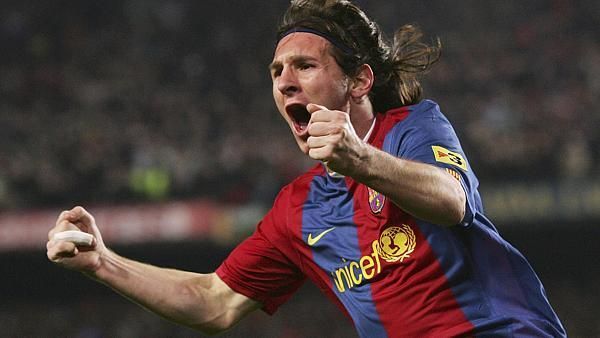
That night in Paris
In 2017, when Sergi Roberto stretched his way to glory against PSG, fingers were pointed at the possible dive from Luis Suarez. Yes, Suarez seemed to go down too easily. But how did it come down to that one incident? How did Barcelona manage to come back from the dead to do the seemingly impossible?
When Cavani slammed the goal past Ter Stegen, the only people sad were Cules all around the world. The others didn't want to see this team achieve the impossible. But this team didn't mind those who were against.
They had 90,000 people still glued to their seats when they needed three goals. They had a million others watching at home, strangely in India at late night, when the next day was the starting date of CBSE Senior School Certificate Board Exams. Kids stuck with them, fans stuck with them.
When Neymar tied his shoelaces, he had that look on his face, 1% chance of conversion, 99% faith that he would convert. What this team did at Camp Nou was a miracle, that would never be replicated. A night when Neymar stepped up.
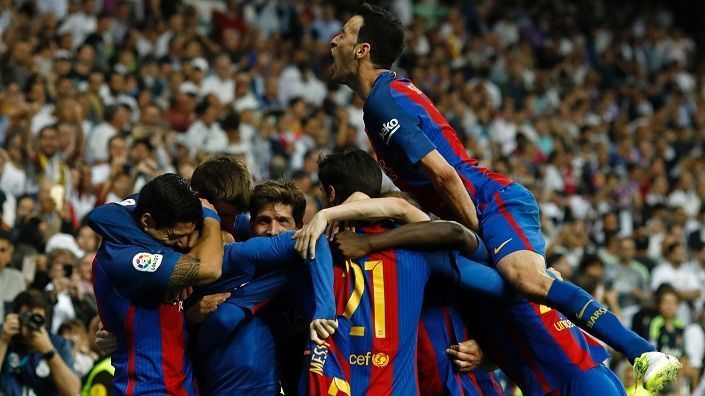
Then a month later, they were fighting to keep possession deep in their half. Santiago Bernabeu was about to roar into celebrations of a draw, that was possibly a title decider. When the whole of the world was ready to witness a 2-2 draw, FC Barcelona wasn't. Sergi Roberto switched gears from right back spot, into the midfield.
When Andre Gomes got the ball, the man who was horrendous at decision making made the apt decision to play Jordi Alba in. Jordi Alba needed no second touch to send the ball into Messi's trajectory and here was the little man, catapulting the ball past Navas, holding his shirt up high at the Bernabeu.
Then they had a poor transfer window. They lost Neymar. They lost to Real Madrid by a 5-1 margin. They were set to have a horrible upcoming season. But then again they fought the odds. Lost only five total games in 2017-18 season, won the domestic double, but not without a fight.
Getafe put them in deep waters, but Denis Suarez and Paulinho came to the rescue. The Anoeta put them down 2-0, but this team fought to win 4-2. The RCDE Stadium jeered at Pique and abuse Umtiti racially. The stadium was more like a swimming pool with puddles all over.
But this team overcomes everything, the fans, the pitch and the physicality of RCD Espanyol. When Leo Messi sent the freekick in Pique stood over every person and headed it. Not because he doesn't have body fat, not because he jumps higher than an average NBA player, but because the team that he plays in has taught him to be resilient.
The Ramon Sanchez Pizjuan fans celebrated in Leo Messi's face when they were leading 2-0. It was 88 minutes before Luis Suarez found a way to equalize. The next minute Leo Messi struck a goal from outside the box, and that was that. A match Sevilla had won for the majority of the 90 minutes but lost out to the resilience of this team.
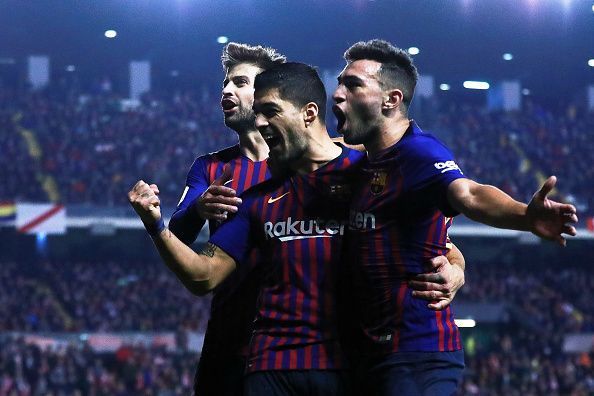
And now, Barcelona look good for yet another treble-winning season. But they showcase resilience even now. Whether it was fighting to protect a 1-0 lead at Valladolid’s horrible pitch or fighting till the 90th minute to score a winner against Cultural Leonesa, this team is defiant. And even this past Sunday, when Barcelona visited the grounds of Rayo Vallecano, resilience was the only thing that got them through.
Perhaps they didn’t deserve to win and were not up to their mark, and certainly, they didn’t dominate the game. But they were resilient, fighting till the very last moment. When Dembele scored the equalizer, celebrations were not what the team was thinking of.
They had three minutes of regulation time left and at the 90th minute, Sergi Roberto picked Suarez out to score the winning goal.
Valverde's men don't lack the spirit
This team might have faced humiliating losses, might not have played the best football at times but whatever comes, this team fights. The irresistible force against the immovable object was used as a tagline for many big events. FC Barcelona is the irresistible force, come what may, they will fight.
They have fought hard in the past and they will continue to do so. Love or hate Barcelona, it has to be said that this team breathes up to its necks in dire circumstances. Over the years, resilience has become synonymous with Barcelona, and rightly so. And one bad game against Roma doesn’t change the fact.
Every day some, or the other player steps up. Messi at Bernabeu, Neymar against PSG, Pique at RCDE Stadium, Coutinho in the 5-4 loss against Levante. These are some of the countless individuals who stepped up. But were they alone?
Ter Stegen held strong against PSG, Sergi Roberto was the one who initiated the counter against Madrid, Suarez-Sergi-Dembele all forced the case against Vallecano. Against Inter, it was not Malcom alone but the whole team that pushed till the final moment. The team fights together.
FC Barcelona, just like Linkin Park, struggled at their initial phases. Both saw huge mainstream success in their peak years. Both have set a legacy in their fields that would possibly never be replicated and both have exemplified resilience.